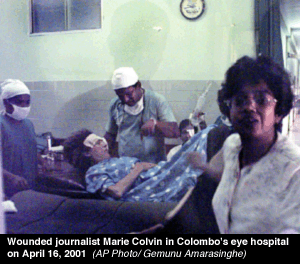
Government Threatens to Impose Additional Restrictions on Foreign Correspondents
New York, April 17, 2001 —The Committee to Protect Journalists (CPJ) is deeply concerned about the injuries suffered by Marie Colvin, an award-winning American journalist who works for the British newspaper The Sunday Times. Colvin, who was caught yesterday in a skirmish between rebel forces and government troops, received four shrapnel wounds in her head,…
Sri Lanka: Reporter threatened after covering alleged rape of jailed Tamil women
Your Excellency: The Committee to Protect Journalists (CPJ) is deeply concerned about the security of A.S.M. Fasmi, a reporter for the Tamil-language newspaper Thinakkural. Fasmi, who is based on the northern island of Mannar, says he has been detained, interrogated, and threatened repeatedly with death since he reported on the alleged rape of two Tamil women detained by local security forces last month.
Reporter’s murder still unsolved
Your Excellency: The Committee to Protect Journalists (CPJ) requests information about the status of the investigation into the murder of Mylvaganam Nimalarajan, a Jaffna-based journalist who was killed in October 2000. Nimalarajan covered the civil war for various news organizations, including the BBC’s Tamil and Sinhala-language services, the Tamil-language daily Virakesari, and the Sinhala-language weekly Ravaya.
Attacks on the Press 2000: Preface
By Peter ArnettSHE STOOD DEFIANTLY IN THE CRAMPED QUARTERS OF ISTANBUL’S BEYOGLU CRIMINAL COURT at high noon of a hot midsummer day. The slight, dark-haired Nadire Mater had a message for the court and for the two dozen Turkish reporters and photographers who had gathered to hear her. “The truth is plain to see. Banning…
Attacks on the Press 2000: Introduction
By Ann CooperIN THE COMMUNITY OF JOURNALISTS WHO HAVE CHRONICLED the past decade’s worst wars, the news last May was devastating. Two of the world’s most dedicated war correspondents, Kurt Schork of Reuters and Miguel Gil Moreno de Mora of The Associated Press, were killed in a rebel ambush in Sierra Leone, a country where…
Attacks on the Press 2000: Asia Analysis
DESPITE PRESS FREEDOM ADVANCES ACROSS ASIA IN RECENT YEARS, totalitarian regimes in Burma, China, North Korea, Vietnam, and Laos maintained their stranglehold on the media. Even democratic Asian governments sometimes used authoritarian tactics to control the press, particularly when faced with internal conflict. Sri Lanka, for instance, imposed harsh censorship regulations during the year in…
Attacks on the Press 2000: Sri Lanka
RI LANKA’S LIVELY AND COMBATIVE MEDIA FACED NUMEROUS CHALLENGES from a hostile government, with the most intense battle waged over the president’s tightening of censorship restrictions. Press coverage of the country’s 17-year-old civil war remained thin, due to intermittent censorship and because the government refused to grant journalists regular access to the conflict areas in…
Journalist assassinated in his home
Your Excellency: The Committee to Protect Journalists (CPJ) condemns the murder yesterday of veteran journalist Mylvaganam Nimalarajan, a Jaffna-based journalist who reported for various news organizations including the BBC’s Tamil and Sinhala-language services, the Tamil-language daily Virakesari, and the Sinhala-language weekly Ravaya.
Military-Related News Still Restricted
New York, September 8, 2000–The Committee to Protect Journalists (CPJ) wrote to Sri Lankan president Chandrika Kumaratunga today, welcoming her decision to ease censorship restrictions on the media. However, CPJ noted that censorship of military-related news remains in place, in violation of Sri Lanka’s international obligations to uphold press freedom. “We do not think that…